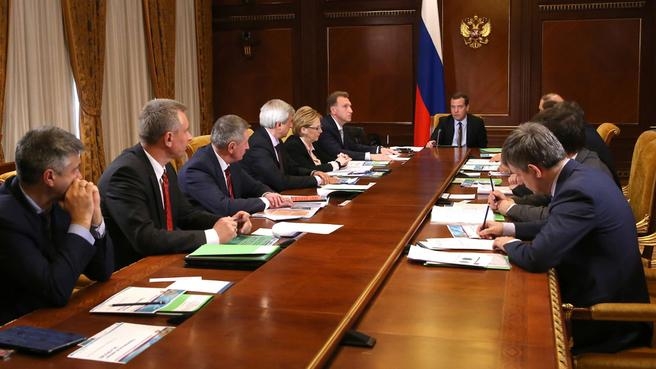Meeting
Excerpts from Dmitry Medvedev’s opening remarks:
Today, we are talking about the exhaustion of trademark rights. On the one hand, under the current economic circumstances, a transition to the international principle of the exhaustion of trademark rights might become a fairly important anti-crisis measure. In effect, this would legalise so-called parallel imports and allow us to import goods bearing the relevant trademark. Any importer will be entitled to the said trademark rather than its owner or official distributor. Therefore, it will be possible to purchase produce in third countries for less, and bring it to our territory without the knowledge of its manufacturer or rights holder. Naturally, this will promote competition and somewhat reduce prices.
Fairly large countries, advanced and developing market economies, apply the principle of the exhaustion of trademark rights – Canada, Japan, China, India and South Africa. However, this principle never exists in a refined form. Every country is attempting to interpret it in its own way, proceeding from its national interests.
On the other hand, a transition to this international principle will increase the number of importers and reduce the control of rights holders over imported goods.
This might lead to the appearance of more counterfeit products on the market and we are not doing well in this regard, to put it mildly.
In this context, we will have to enhance control over parallel imports, introduce special customs and other inspections and regulate the certification of products imported into our territory.
One more aspect is our commitments in the Eurasian Economic Union (UAEU).
We must coordinate all decisions we take with our partners. Speaking strictly, we should make common decisions.
Therefore, we must hold consultations with our colleagues from Kazakhstan, Belarus and Armenia, and listen to their opinions; all the more so, as they are different, explain our position to them and eventually adopt uniform rules.
We should also bear in mind that the regional principle now applied in Russia was a favourable term for our foreign investors – it allowed them to localise their production on our territory. Investments have been made and we shouldn’t forget about this.
We must act with caution and attention, listen to representatives of purchasers on the Russian market, as well as investors, and, of course, conduct consultations with our international partners. In any event, no matter what decisions we make, they can only be implemented after we reach an international consensus in the EAEU.












